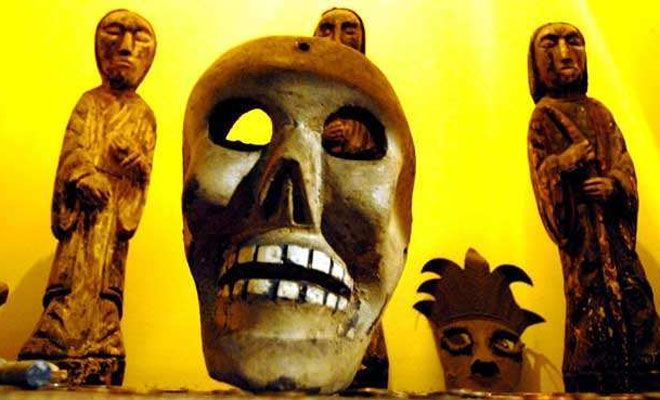

Obeah has no creed or organized service of worship. Obeah (or Obecyahism) is not to be confused with the formalized rites of Haiti's more familiar voodoo. Their powers can both heal and harm and are for hire by rich, poor, black and white. They speak in unknown tongues, which not even they themselves can always understand. Caribbean obeahmen live in seclusion in the bush, out of the eye of the law, which is forever on their trail. Since obeah is technically illegal on most islands, its believers maintain a conspiracy of silence. Obeah is a private pursuit, something just between a fellow and his fears. Brought over centuries ago by African slaves, it has thrived, enhanced by superstitions prevalent among Scotch and Irish Highlanders, interlaced with Christian ritual and aided by an expert botanical knowledge inherited from the Carib Indians. Tourists seldom realize how powerful and persistent this obeah, or necromancy, is throughout the Caribbean islands. Peace of mind is still something to be worn around your neck. Man's scientific advancements may have taken him to the moon, but witchcraft remains alive and hexing in the West Indies. A person might turn to obeah if he yearns to see his competitor's business fold, or if he wants to clinch a promotion, or if he needs spell that will make him irresistible to the opposite sex. It is too secret, too mercurial for statistical study, but it found everywhere in the West Indies, and believers consider it effective both in matters of life and death and in day ‐to ‐day affairs. This is obeah, the black magic of the Caribbean. They know they were expected to suffocate and die within nine days, like the chicken that was to have bean buried with the body. Those mourner,: who are named flee the scene in panic. With it are slips of paper bearing the names, birth dates and addresses of certain people. In Georgetown, Guyana, a live black chicken is found under the clothes of a not‐yet‐buried corpse.

It is not until her husband sets down rules for his second wife concerning the upbringing of the first wife's son that the ghost vanishes. The night fishermen see her, standing there in the same white dress in which she was married and buried. Then his first wife begins showing up at the front gate. In Jamaica, a dying woman warns her husband that if he mistreats their son, she will come back to haunt him.


Later the girl learns that her grandmother has died at that very moment. She recognizes the rings on the hand waving good‐by as her grandmother's, hut when she rushes outside, no one is there. On Barbados, an 18‐year‐old girl is awakened by a tapoing at her window.


 0 kommentar(er)
0 kommentar(er)
